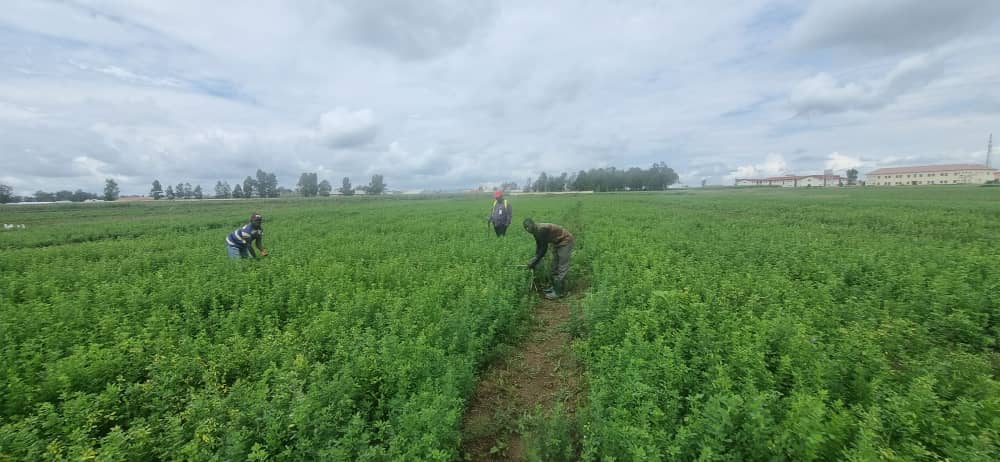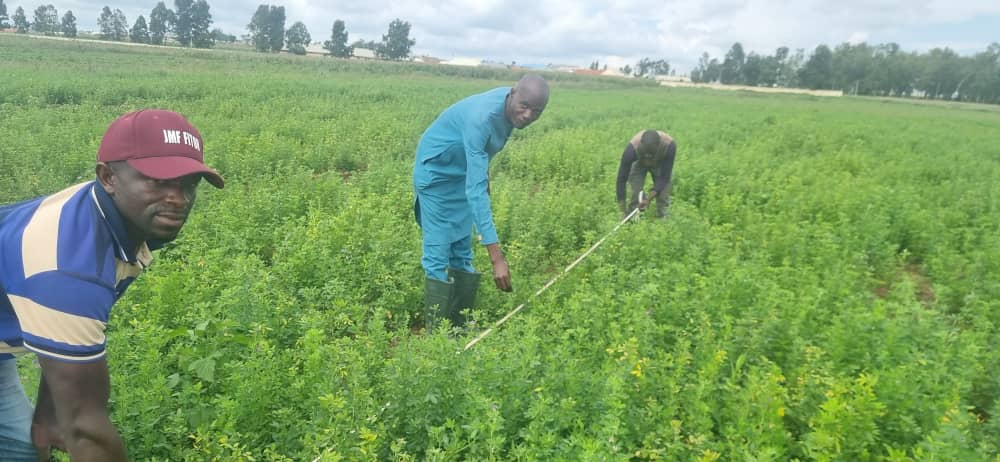Nigeria’s farmer-herder conflict is often framed as a security crisis. It is also a feed crisis. If cattle have access to reliable, nutritious fodder, roaming would decline, farm damage would reduce, and protein output would rise. New alfalfa trials in Plateau State show a practical path forward, high yields, strong germination, and protein levels that meet international standards, pointing to fodder as a peace and productivity strategy.
From Conflict to Fodder: A New Approach
Experts have rightly noted that feed and fodder are the lifeblood of any sustainable livestock production system. Feed alone accounts for over 70 percent of production costs in animal agriculture and is a key factor in the recurring farmer-herder clashes. Ensuring ample, affordable feed has crossed over from being merely an economic issue into a matter of national security and peace. This is where alfalfa (Medicago sativa) comes in as a potential game-changer.
Meet Alfalfa: The “Green Gold” of Livestock Feed
Alfalfa, also known as lucerne, is often called the “queen of forages” globally, and for good reason. It is a perennial legume rich in protein, vitamins, and minerals, making it one of the most nutrient-dense animal feed crops in the world. In countries like the United States, Argentina, and Sudan, alfalfa is widely cultivated as high-quality hay and silage for dairy and beef cattle. Per Wikipedia, alfalfa is, in fact, the most cultivated forage legume worldwide, with over 30 million hectares grown and roughly 436 million tons produced annually. This “green gold” improves livestock weight gain, milk yield, and overall productivity. It also enriches the soil by fixing nitrogen and preventing erosion, a bonus for sustainable farming.

Despite its global prominence, alfalfa has been virtually absent from Nigeria’s agricultural landscape – until now. Historically, livestock farmers have relied on natural grasses and crop residues, which are seasonal and nutritionally inadequate. Alfalfa offers a superior alternative: it can be cut multiple times a year, yielding large volumes of protein-rich fodder. Trials elsewhere in Africa show promise. For example, Sudan and South Africa have become leading producers, leveraging irrigation and dry-season cultivation to export alfalfa hay to the Middle East. If these countries can turn fodder into export earnings, why shouldn’t Nigeria harness alfalfa to feed its own animals and even generate revenue?
A Breakthrough in Plateau State
Skeptics might wonder if a temperate-climate crop like alfalfa can grow in Nigeria’s environment. Recent evidence emphatically says yes. In May 2025, a public-private partnership in Plateau State – led by The Alternative Bank and Plateau State University – unveiled a landmark alfalfa cultivation project that has yielded stunning results. Planted in the cooler “near-temperate” climate of Bokkos, Plateau, alfalfa seeds imported from Kenya thrived in local soil. Germination rates exceeded 85 percent in two weeks, and plants reached 66.5 cm in just 13 weeks, matching global growth benchmarks. Under rain-fed conditions, the trial plots are projecting annual yields of 18 to 20 tonnes per hectare – at par with what farmers get in the Americas and Europe. Laboratory tests indicate the crop’s protein content will meet international standards, meaning Nigerian-grown alfalfa is just as nutritious as imported feed.
The Alternative Bank’s CEO, Hassan Yusuf, described the achievement as a breakthrough moment, declaring that alfalfa can redefine livestock farming and secure Nigeria’s food future. At a field day showcasing the trials, herders, farmers, students, and government officials watched cattle eagerly feed on the lush alfalfa plots – a vivid demonstration of its palatability. The Plateau State Commissioner for Agriculture hailed the project and signaled plans to expand cultivation to all 17 Local Government Areas as part of a strategy to unlock the livestock value chain. Local herders also expressed gratitude and pledged support, seeing in this crop a hope for harmonious coexistence.
Why Alfalfa Matters for Nigeria’s Food Security
The success in Plateau State has profound implications for Nigeria’s agricultural future. Alfalfa, a high-quality, climate-resilient fodder, offers multiple benefits that address some of the country’s most pressing food security challenges. By providing reliable feed, alfalfa can be a practical solution to the herder-farmer conflicts, mitigate the need for pastoralists to roam, and foster collaboration between herders and crop farmers. This could pave the way for more settled livestock production and greater food security. Richard Mark Mbaram, Special Adviser on Knowledge Management and Communication to the Federal Ministry of Livestock Development, stated, “This isn’t just about growing grass. It’s about securing our food systems, reducing conflict, and giving pastoralists and farmers new tools for climate resilience.”
Farmers who feed alfalfa report better fertility and higher market value for their livestock, which could reduce the feed costs that currently dominate farming expenses. This would make livestock farming more profitable and help lower the cost of dairy and meat production, making these products more affordable for consumers.
Additionally, alfalfa’s environmental benefits cannot be overlooked. It is deep-rooted, drought-tolerant, and helps improve soil fertility by fixing nitrogen. This makes it a valuable crop for semi-arid regions prone to erratic rainfall, providing a more reliable fodder supply compared to natural grasses that wilt in drought. Alfalfa cultivation also rehabilitates degraded land and enhances farm sustainability by serving as green manure in crop rotations. This fits well within Nigeria’s push for climate-smart agriculture.
The widespread adoption of alfalfa offers significant economic opportunities. The African Union’s Inter-African Bureau for Animal Resources estimates a $1 billion investment potential in Nigeria’s feed and fodder sector. Entrepreneurs can tap into seed production, hay processing, and feed marketing, creating jobs in rural communities. Nigeria is already making strides, with a commercial alfalfa farm established in Jigawa State. There is a growing market for alfalfa hay in international markets such as the UAE and China, with Nigerian states like Benue eyeing fodder exports. As alfalfa production scales, it will not only support the livestock sector but also bolster Nigeria’s leather and dairy industries by ensuring a steady supply of high-quality raw materials.
Scaling Up: What Will It Take?
Adopting alfalfa nationwide will not be without challenges. Its cultivation must be adapted to suitable climates, starting with Plateau and other elevated regions, while research continues into heat-tolerant varieties. Researchers like Dr. Hosea Finangwai, of Plateau State University caution that alfalfa is “a temperate plant,” which is why seeds were sourced from Kenya and tested in Plateau’s cooler environment. Earlier attempts to grow alfalfa in parts of the country failed due to unfavourable climate. This means we need to identify other micro-climates or seasons in Nigeria where alfalfa can thrive, and possibly develop or import tropicalised alfalfa varieties that can handle heat and humidity. Areas in the north with cooler dry seasons, or elevations like Mambilla Plateau, could be candidates. Research institutions and universities should be funded taking a cue from the model adopted by The Alternative Bank to conduct adaptability trials across regions.
Right now, virtually all alfalfa seed in Nigeria is imported and expensive. To scale up, we must establish a local seed multiplication program. Building a robust alfalfa seed system, from certified seed production to distribution, is critical. The government can encourage this by fast-tracking the registration of alfalfa as an official pasture crop (interestingly, recent efforts registered eight other forages but not yet alfalfa). Additionally, extension services will need to educate farmers on alfalfa agronomy, irrigation, and harvesting, since it’s a new crop for them. Initiatives to provide affordable irrigation equipment (like solar-powered boreholes or drip kits) will also help, given that dry-season cultivation of alfalfa may require watering.
It is heartening that Nigeria’s Federal Ministry of Livestock Development is formulating a National Animal Feed and Fodder Policy. That policy should explicitly incorporate crops like alfalfa and set targets for fodder production across the federation. Government support could include land allocation for pasture development, soft loans or grants for fodder farmers, and smart subsidies (for example, seed subsidies or guaranteed buy-back schemes). States, especially those plagued by herder-farmer crises, should follow suit. In the South-West, where herder incursions have recently put 40% of the region’s food production at risk, state governments and regional bodies are now discussing establishment of modern ranches. This must go hand-in-hand with growing fodder like alfalfa on a large scale. Ranching without reliable feed is doomed to fail. Leaders in these states would be wise to invest in pasture projects and even partner with northern herders on a win-win solution: settled ranches stocked with high-yield fodder, managed jointly for mutual benefit.
Perhaps the most encouraging aspect of the Plateau alfalfa project was the involvement of an “ethical” non-interest bank as a key driver. The Alternative Bank’s role shows how innovative financing models can unlock agricultural potential. By using profit-sharing and impact-focused investment, the Bank could fund a project many commercial lenders would shy away from. This model, where financial institutions work closely with researchers and farmers, is worth replicating. We need more agritech startups, agribusiness companies, and financial institutions to see fodder as the next frontier. Public-private partnerships (PPPs) can establish seed farms, mechanised hay bailing facilities, and feed mills. The recently launched Feed-Fodder-Livestock Investment Deal Room, facilitated by Nigeria’s feed and fodder stakeholders in collaboration with Sterling Bank, is a step in the right direction. It has already attracted investors for large-scale projects, such as a 1,000-hectare fodder farm in Benue State. This momentum must be sustained.
Time to Make That Move
The time to act is now. As Nigeria grapples with food insecurity, the clock is ticking, and the solution lies in how we address the root causes: the scarcity of quality livestock feed and the conflict it breeds. The adoption of alfalfa as a sustainable fodder crop offers a powerful tool for transforming the nation’s agricultural landscape. But transformation requires bold steps from all sectors: government, private enterprises, and farmers alike.
This is the moment to embrace innovation and actively invest in long-term solutions. The Alternative Bank, through its groundbreaking partnership with Plateau State University, has demonstrated the immense potential of alfalfa to solve not just an agricultural problem, but a national security issue.
From policymakers who must adopt forward-thinking policies to investors and agribusiness leaders who can fund the cultivation and scaling of alfalfa, everyone has a role to play. The government can lead with progressive policies and provide necessary subsidies, while financial institutions like The Alternative Bank can innovate financing solutions that make it easier for farmers to transition to fodder cultivation. Similarly, farmers must embrace new technologies and cultivate this green gold for the future of their livelihoods and the nation’s prosperity.
Now is the time to make that move. By investing in alfalfa, Nigeria can finally end the vicious cycle of conflicts, boost agricultural productivity, and set the foundation for a secure, sustainable food future. In short, the seeds of change are already planted, but it is up to us all to nurture them and harvest the promise they offer.
No single crop is a silver bullet, of course. Alfalfa will not miraculously solve all of Nigeria’s agricultural woes. However, its recent introduction has shown what is possible with vision and collaboration. The Plateau State pilot transformed skeptical local farmers into curious experimenters ready to give this “magic” plant a try. It turned herders who were once at odds with farmers into partners gathered around the same demo plot, hopeful for a future where cows stay fat without communities going hungry. This is the kind of change we need at scale.






